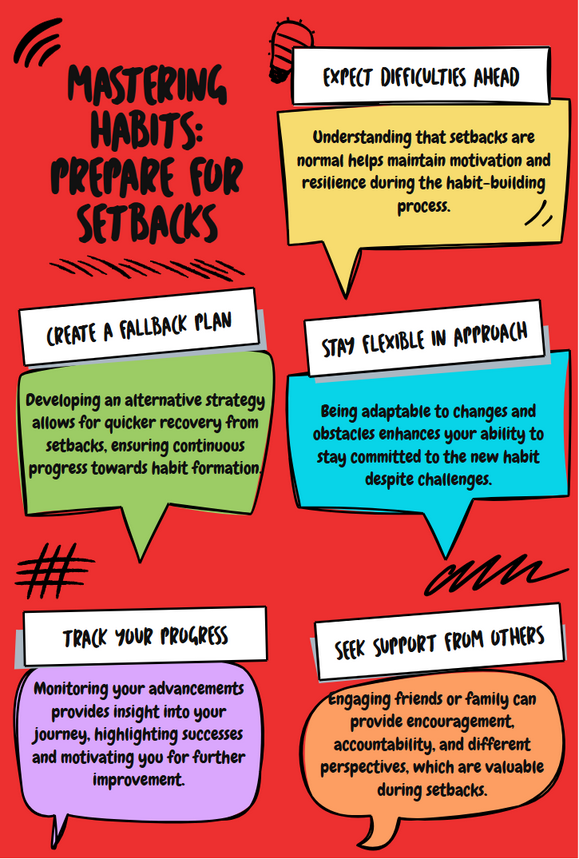
Ready to master your habits and transform your life? Whether you’re aiming to break free from old patterns or cultivate new, positive behaviors, understanding the science behind habit formation is key.
Table of Contents
Introduction
Have you ever reached for your phone as soon as you wake up? Or maybe you’ve tried to start journaling every day, but stopped after a few days? You’re not alone. Habits shape our lives, from small routines to big behaviors, but changing them can feel tough. The good news is that there’s a clear way forward. In this article, we’ll walk through the “7 Steps To Break (or Make) A Habit” Challenge—a simple, practical guide you can use in real life.
Master Your Habits: The Key To Your Potential
We are basically the habit of what we repeatedly do. From culture to habit to the subconscious thought processes that we go through from the time we open our eyes in the morning to the time we close them at night, there are so many things–both hidden and overt–that influence what we think, how we feel, and in turn, the direction that we take our lives.
The reality of life is much like a smelly onion. What people often fail to understand about the practicalities of habit change is that habit hacking isn’t just a few tweaks or adjustments in behavior; it’s a radical redesign of your daily life to meet long-term goals, leading to real, powerful, and permanent change.
Master Your Habits: The Cornerstone of a Fulfilling Life
Habits significantly influence our daily lives. They shape our identity, impact our achievements, and often determine our direction. More than repeated actions, habits are routines we follow automatically and have a measurable effect on our outcomes. To realize your potential and manage modern challenges, it is essential to take control of your habits.
Improving your habits begins with awareness. Many habits develop unconsciously, often influenced by our environment or emotions. For example, checking social media in the morning, delaying important tasks, or choosing unhealthy snacks can gradually undermine well-being and hinder progress if left unchecked.
Step 1: Choose Your Target Habit

Clarity Beats Ambition
Vague goals, such as “eat healthier” or “exercise more,” are harder to stick to. Choosing a specific, clearly defined habit—such as “eat one piece of fruit with breakfast”—makes it easier to track progress and stay consistent.
The first step to mastering your habits is picking one to focus on. Try working on just one habit at a time so it doesn’t feel overwhelming. Think about what you’d like to change or improve in your life.
Perhaps you’d like to wake up earlier, drink more water, or read every day. Pick a simple habit that’s easy to understand, so you know exactly what you’re aiming for. Choose something you care about, since it’s easier to stick with a habit you value. Once you’ve chosen your habit, focus on making it a regular part of your daily routine until it becomes a natural part of your life.
Step 2: Understand Your Cues
To take control of your habits, start by identifying the triggers that prompt them. These cues are the small signals that tell your brain it’s time to act. They might be a certain time of day, a feeling, or something you see around you. For example, you might reach for a snack while watching TV or check your phone when you feel bored. Pay attention to what happens right before you start your habit to spot these cues. Once you understand what triggers your habits, you can modify your routine or adjust your surroundings to cultivate better habits or break old ones. Understanding your signals puts you in control and helps you make the changes you want.
Step 3: Break It Into Bite-sized Pieces

Small Wins Build Confidence
When you finish a small step, you feel a sense of accomplishment. This helps you stay motivated and believe that you can make bigger changes over time.
Trying to do everything at once can be discouraging. Each small step moves you toward your goal, gradually building momentum.
Start Tiny
If you’re trying to read more, start by promising yourself just one page a night. This single gesture can put you on the path toward your goal. Want to cut down on caffeine? Try switching to herbal tea instead of coffee for the second half of the week. Afterwards, take a moment to recognize your accomplishment—you deserve to feel good about it.
Now that you’ve explored how to start small, you may wonder: Why go small?
Even tiny successes boost confidence and make change easier. Small wins add up, helping you achieve more than you expected.
Step 4: Create Environmental Nudges
Environmental nudges are minor modifications to an individual’s surroundings designed to facilitate desired behaviors and discourage undesired actions. Structuring the environment appropriately can significantly influence habit formation. This method utilizes the habit loop, which comprises cue, routine, and reward, to reinforce behavioral objectives.
As you consider breaking goals into smaller steps, remember that your environment can play a significant role in helping or hindering you on your way. The small tweaks you make to your surroundings can silently nudge you closer to your goals.
Tweak Your Environment
Is the morning reserved for workouts? Lay out your shoes and clothing the night before to make it easier.
Trying to resist sugary snacks? Monitor who’s eating the fruit, and keep chips where they’re harder to find.
When willpower falters, adjusting your surroundings can keep you on track with your objectives.
Step 5: Track Your Progress

Helps You Spot Patterns
Tracking your progress reveals behavioral patterns you might overlook. For instance, you may notice that you skip your habit on weekends or after stressful days, which helps you address specific challenges.
Measurement makes the invisible visible. Seeing even slow progress can motivate you to keep going.
Simple Methods to Track
For example, you can use a calendar or habit tracker. Tracking your progress allows you to see changes that you might otherwise miss. Success, even the slow kind, can be motivating. Regularly review your results to see what’s working and where you’re encountering snags.
During the period when I stopped scrolling at night, it was a sticker calendar that held me accountable. I was surprised by how motivating it was—I didn’t want to break the chain. Tracking progress in small ways can create the motivation needed to keep going.
Step 6: Prepare for Setbacks

Very few historical changes progress in a straight line. Anticipating slip-ups helps you recover and prevents setbacks from derailing you.
Plan for Rough Patches
Potential barriers might include travel, anxiety, or social pressure—identify these early.
Have a plan in advance for bouncing back. You might text an accountability buddy or remind yourself why you started this journey.
See slip-ups as learning opportunities, not failures.
Remember, getting off track does not mean failure—it simply means you’re human. Embracing forgiveness at these moments creates long-term motivation, far more than guilt ever could.
Step 7: Celebrate Wins—Big and Small

Celebrating Triggers Dopamine Release
Recognizing small achievements increases dopamine, which supports motivation and makes it easier to maintain positive habits.
Before you move on to celebrating progress, recognize the effort you’ve made, not just the final destination. By doing this, you keep the cycle of positive change in motion and reinforce your own motivation.
Ways to Reward Yourself
- Alternatively, you might choose to share your progress with a friend, turning their encouragement into another source of motivation.
- Try to do something you enjoy, as long as it doesn’t derail your progress; this balance ensures you remain on track while rewarding yourself.
- Pause and observe how you feel at this moment. Then, compare your current state with how you felt before you began, noticing the changes.
All these small achievements count—whether it’s doing something you enjoy or sharing with a friend. For example, for me, getting through my first week without using my phone late at night felt like a genuine victory. That one week made me realize that I could go on. Remember, habits—whether the kind you’re trying to kick, or the ones you’re hoping to form—have little to do with willpower or making grand change. Instead, it’s a process; a sequence of thought-out, doable steps that make long-term changes possible.
Conclusion: The Ripple Effect of Mastery
Gaining control of your habits isn’t about perfection. Instead, it’s about building a foundation for growth and joy. These seven phases guide you in creating good habits and understanding yourself. This mastery benefits relationships, careers, health, and happiness. Begin with simple, practical fat-burning advice to transform your habits and achieve lasting well-being.
